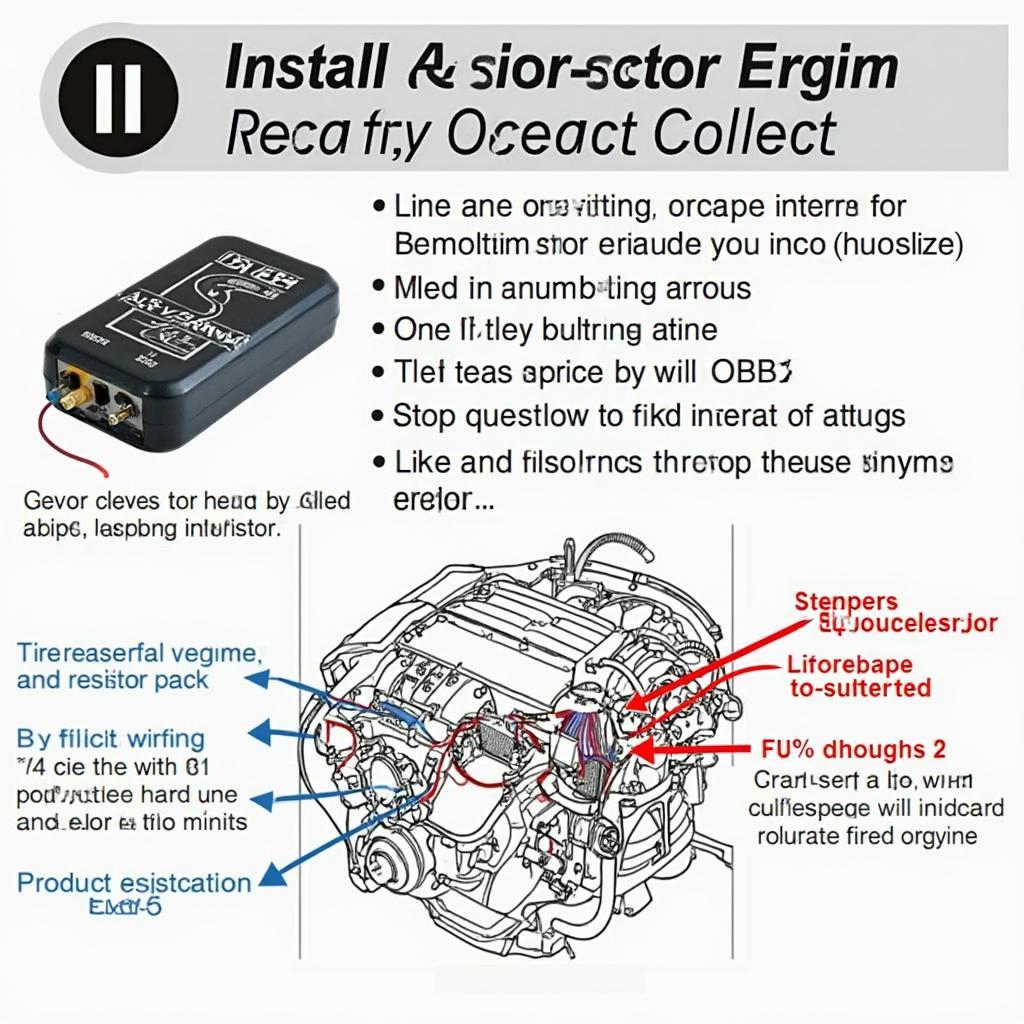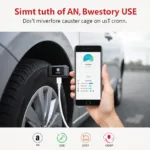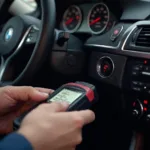The question of whether you can use OBD1 injectors in an OBD2 engine is a common one, and the answer isn’t a simple yes or no. Understanding the differences between these two systems is crucial to making the right decision for your vehicle. This article will delve into the complexities of OBD1 and OBD2 systems, focusing on injector compatibility and the potential challenges you might face.
OBD1 vs. OBD2: Key Differences and Injector Functionality
OBD1 (On-Board Diagnostics 1) and OBD2 (On-Board Diagnostics 2) are systems designed to monitor and diagnose vehicle emissions and performance. OBD1 systems are generally simpler, relying on basic sensors and a less sophisticated computer system. OBD2, introduced in 1996 in the US, is much more advanced, with stricter emission standards and more comprehensive diagnostic capabilities. This difference extends to the fuel injectors and how they are controlled. OBD1 injectors are typically low-impedance (peak-and-hold) and are controlled by a simpler driver circuit. OBD2 injectors, on the other hand, are high-impedance (saturated) and require a more complex driver circuit capable of handling the higher impedance.
While both systems aim to deliver fuel efficiently, the way they achieve this differs significantly. OBD1 relies on a batch-fire injection system, where all injectors fire simultaneously. OBD2 often uses sequential fuel injection, firing each injector individually and timed precisely with the engine’s firing order. This leads to improved fuel economy and reduced emissions.
Challenges of Using OBD1 Injectors in an OBD2 Engine
The primary challenge lies in the electrical incompatibility between the two systems. Connecting low-impedance OBD1 injectors to a high-impedance OBD2 system can overload the driver circuit, potentially damaging the ECU (Engine Control Unit). Conversely, using high-impedance OBD2 injectors in an OBD1 system might not provide sufficient fuel flow, leading to performance issues.
Another issue arises from the difference in control strategies. The OBD2 system’s precise timing and control over individual injectors are lost when using OBD1 injectors. This can disrupt the engine’s combustion process, negatively impacting performance, fuel economy, and emissions. Furthermore, the OBD2 system might not accurately detect issues related to fuel delivery, making diagnostics more difficult.
Can it be done? Adapters and Workarounds
While not directly compatible, some workarounds might allow the use of OBD1 injectors in an OBD2 engine. Resistor packs can be used to increase the impedance of OBD1 injectors, making them somewhat compatible with the OBD2 system. However, this is not a guaranteed solution and can still lead to performance issues or damage to the ECU.
Another option is using a standalone engine management system. These systems bypass the factory ECU and allow for greater control over fuel injection, ignition timing, and other engine parameters. With a standalone system, you can configure it to work with OBD1 injectors, overcoming the compatibility issues. However, this solution is typically more expensive and complex than using compatible injectors.
“Using a standalone ECU offers flexibility, but it’s a significant investment. Proper tuning is vital to ensure optimal performance and avoid engine damage,” says automotive engineer, Dr. Michael Stevens, from the Automotive Research Institute.
Why Compatibility Matters: Performance, Emissions, and Diagnostics
Using the correct injectors for your OBD system is crucial for optimal engine performance, meeting emission standards, and ensuring proper diagnostics. Mismatched injectors can lead to various issues, including poor fuel economy, rough idling, reduced power, and increased emissions. Additionally, diagnostic trouble codes (DTCs) might not accurately reflect the underlying problem, making troubleshooting more challenging.
“Choosing the right injectors isn’t just about performance. It’s about ensuring the longevity of your engine and complying with environmental regulations,” adds Dr. Stevens.
Conclusion: The Best Approach for Your OBD2 Engine
While workarounds exist, using OBD1 injectors in an OBD2 engine is generally not recommended. The potential for performance issues, ECU damage, and diagnostic challenges outweighs the benefits. The best approach is to use injectors specifically designed for your OBD2 system. This ensures optimal engine performance, compliance with emission regulations, and accurate diagnostics. If modifications are necessary, consult with a qualified automotive professional to determine the best course of action.
FAQ
-
What is the main difference between OBD1 and OBD2 injectors? OBD1 injectors are typically low-impedance, while OBD2 injectors are high-impedance.
-
Can I damage my ECU by using the wrong injectors? Yes, using incompatible injectors can overload the ECU’s driver circuit, leading to potential damage.
-
What are resistor packs, and how do they work? Resistor packs increase the impedance of low-impedance injectors, making them somewhat compatible with high-impedance systems.
-
What is a standalone engine management system? A standalone system replaces the factory ECU, offering greater control over engine parameters, including fuel injection.
-
Why is using the correct injectors important? Using the correct injectors ensures optimal performance, compliance with emission standards, and accurate diagnostics.
-
What issues can arise from using the wrong injectors? Issues can include poor fuel economy, rough idling, reduced power, increased emissions, and inaccurate diagnostic trouble codes.
-
Who should I consult if I need to modify my fuel injection system? Consult with a qualified automotive professional for advice and assistance with modifications.
Other related articles on OBDfree:
- Understanding OBD2 Codes and Their Meaning
- Choosing the Right OBD2 Scanner for Your Needs
- Common OBD2 Problems and Solutions
We encourage you to reach out if you require further assistance. Contact us via WhatsApp: +1(641)206-8880, Email: [email protected], or visit our office at 789 Elm Street, San Francisco, CA 94102, USA. Our customer support team is available 24/7 to answer your questions.


